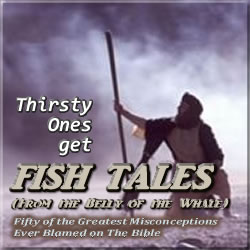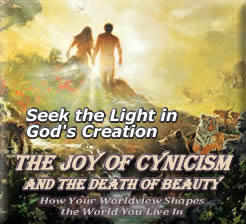Refuting the Ultimate Lie
God’s True Purpose for the Earth
As my graduation day approached and final exams loomed on the horizon, my after-school discussions with my professor became less frequent but more cherished. One day, the old man looked at me like a beloved child, and began, “You know, I’m very proud of your accomplishments here over the last four years. Each semester, you’ve become more and more engaged with your studies, and I have no doubt that whatever path you choose after graduation, you’ll make an important contribution to this world in the years to come.”
“Thank you, Professor. Well, if that’s true, then you can take a great deal of credit for your influence on my academic career.”
He smiled benevolently for several satisfying moments before responding, and when he did, he spoke with an endearing sentimentality. “Still, I do have to tell you that I’m overwhelmed with a bittersweet sense of sadness in seeing you move on from here.”
“Sad? How so, sir?”
“Well, as you know, one of the things I admire most about you is the way you’ve excelled in a worldly pursuit like political science while still fiercely clinging, if you don’t mind me saying so, to your otherworldly faith.”
“Again, Professor, you can take credit more than you can know.”
Tilting his head curiously, he said, “You mean to say the agnostic professor aided and abetted the man of faith. How is that even possible?”
“It’s possible because in all the time I’ve been your student, and all the time you knowing about my Christian faith, you’ve never made me feel intellectually inferior for not thinking like you.”
The old man nodded. “That is nice to know. Still it doesn’t soothe my final concern for you, because I just can’t help thinking that you’d have better served your destiny going to a different kind of school. You know, like a school of divinity. Did you ever consider that?”
“Maybe a long time ago, sure. But once I got here, I never questioned that this was where I belonged.”
“Belonged, you say?”
I nodded affirmatively.
“That is most intriguing,” he continued, “and most unexpected. I can understand how you might feel a sense of camaraderie with your schoolmates, maybe come to appreciate your professors … your classes. But when you use that word, ‘belonged,’ that denotes the kind of thinking one would only expect in a church-oriented environment.”
“I never thought about it that way, but, yes, I can understand why you might think that way. But I really do mean what I say. I know in my heart of hearts, I was meant to be here.”
“I’m so glad you bring that up, because now you’re speaking to the very reason for my melancholy.”
“Really; how so?”
“Well, the reason I have such mixed feelings about you and your time here is that—to my way of understanding, at least—you being a man of faith, I’d have thought you’d consider politics a mere triviality because you view Heaven as the real goal of every believer. Right?”
“I suppose so, sure.”
“You suppose so? What is that supposed to mean? I thought the Christian worldview was that all human governments are destined to be swept away—swept away because they never had or could have any meaningful purpose in the plan of God. Am I completely off base in this regard?”
Story Continues Below
To watch author and historian W. Kent Smith discuss the contents of his book On Earth as It is On Heaven, at the Sacred Word Revealed Conference ’23, hosted by Zen Garcia, CLICK BELOW.
Story Continues From Above
“Not entirely, no. But there is something that always had me thinking differently than most Christians on that subject.”
“Oh, really. So young, and yet so wise. You never cease to amaze me. So, out of all the millions of believers down through the ages, how is that you don’t see your ultimate goal as anywhere but Heaven above?”
“But that’s just it. I’m sure I’m not the only one who thinks this way. It’s just that most who do think differently do so without making a big deal of it.”
“Okay, young man, would you mind letting me in on your little secret. Don’t tell me you had some sort of special revelation, or a vision, or some such nonsense, because then I’d be truly disappointed.”
“Professor, how could think such a thing?”
“But you’d agree with me that most Christians are sitting about just waiting for the Lord to split the sky and wash away this old world, as they describe it. Am I right?”
“Oh, no doubt about it. And that’s where most Christians have completely missed the point of the most important prayer ever uttered in The Bible, prayed by the most important person ever spoken of in The Bible.”
My professor tilted his head, again, as skeptical as ever, then said, “And pray tell, what would that be?”
“Please, Professor, before you write me off completely, hear me out. This wasn’t something I figured out on my own; I just remember a lesson I heard taught at a church I once attended, where the pastor reminded us about what most Christians think of as the Lord’s Prayer. But he pointed out that it shouldn’t be called the Lord’s Prayer; it should really be called the Disciples’ Prayer.”
“The Disciples’ Prayer? Sounds a little sacrilegious, even to me. I mean tradition is tradition.”
“Maybe. But as I recall, Jesus did warn us that the traditions of men could destroy the word of God.”
“Duly noted. Then tell me, why shouldn’t we be calling it the Lord’s Prayer?”
“Naturally, because Jesus never prayed it Himself, because He never had to pray, ‘Father, forgive us of our sins, as we forgive those who sin against us.’ You see: that was the clue that made me realize the pastor was right about this prayer, that there really is more to this prayer than meets the eye.”
“Interesting. And what did you learn from that?”
“I learned that if Christians are so mistaken about that, what else about this prayer might contradict what we’ve been led to believe about it.”
Without saying a word, my professor nodded.“And that’s when it dawned on me,” I continued. “Our entire focus of this prayer has been misplaced. Most people, when they pray this prayer, are assuming it’s a prayer intended to purify us so that when we die we’ll be worthy of Heaven’s grace. It’s all about dying as soon as possible so we can go to where God and Jesus are. But that’s crazy; it’s all upside down, based on the simple meaning of the words of this prayer. Jesus didn’t teach us to turn our backs on the world and our fellow human beings, as if this world is wholly evil. Or else why would He bother to usher in the Kingdom of God on Earth? I mean, why would the Creator go to all that trouble if the Earth itself was incompatible with His ultimate plan for humanity?”
“Interesting. And what does that mean in the context of our discussion?”
“I think it means that when Jesus taught us to pray that God’s will be done on Earth as it is in Heaven, we should start to pay closer attention to why He said something like that. Because maybe, just maybe, God’s true purpose for the Earth involves so much more than tradition has ever led us to believe.”
After several thoughtful moments, during which my professor stared back at me, I couldn’t tell what he was thinking. After so many years of his appreciating the scholastic side of my personality, I wondered if I’d destroyed that in a spontaneous moment where I let my guard down and revealed a side of me that he now found repugnant and illogical. But finally, mercifully, his statue-like gaze transformed into a warm and endearing smile. “Indeed, you are a most unusual and unique young man. And I do hope you never forget just how much I’m going to miss you when you leave this place.”
And that was, in fact, the last day we ever shared a smile—a smile as dear as any smile shared between a real father and son.
“Whoever believes in the divine inspiration of the Holy Scriptures must hope that the religion of Jesus shall prevail throughout the Earth. Not since the foundation of the world have the prospects of mankind been more encouraging to that hope than they appear to be at the present time. And may the associated distribution of The Bible proceed and prosper till the Lord has made ‘bare His holy arm in the eyes of all the nations, and all the ends of the Earth will see the salvation of our God.’”
John Quincy Adams







